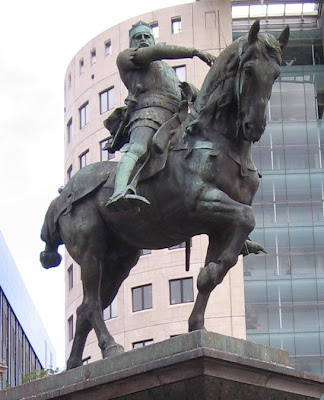 The Black Prince was the son of Edward III, the victor of the Battle of Crécy, where a small English army destroyed a large French one by the use of the medieval equivalent of the tactical nuclear weapon: the longbow.
The Black Prince was the son of Edward III, the victor of the Battle of Crécy, where a small English army destroyed a large French one by the use of the medieval equivalent of the tactical nuclear weapon: the longbow.
 The prince ‘won his spurs’ (became a knight) at the age of 16 at that battle. There is a passage in Froissart that tells us something about the way the prince won his spurs and the sang froid and hard love of Edward III.
The prince ‘won his spurs’ (became a knight) at the age of 16 at that battle. There is a passage in Froissart that tells us something about the way the prince won his spurs and the sang froid and hard love of Edward III.In the morning, the day of the battle, certain Frenchmen and Germans perforce broke through the archers of the prince’s battalion, and came and fought with the men-of-arms hand to hand. Then the second battalion of the Englishmen came to succour the prince’s battalion, the which was time, for they had then much ado; and those with the prince sent a messenger to the king, who was on the little windmill hill.
Then the knight said to the king, “Sir, the Earl of Warwick and the Earl of Stafford, Sir Reginald Cobham, and other such as be about the prince your son, are fiercely fought withal, and are sore handled: wherefore they desire you that you and your battalion will come and aid them, for if the Frenchmen increase, as they doubt they will, your son and they shall have much ado.”
Then the king said, “Is my son dead, or hurt, or on the earth felled?”
“No, Sir,” said the knight, “but he is hardly matched; wherefore he hath need of your aid.”
“Well,” said the king, “return to him and to them that sent you hither, and say to them that they send no more to me, whatever adventure befalleth, as long as my son is alive; and also say to them, that they suffer him this day to win his spurs, for if God be pleased, I will that this day’s work be his, and the honour thereof, and to them that be about him.”
Then the knight returned again to them, and showed the king’s words, the which greatly encouraged them; and they repented in that they had sent to the king as they did.
Thus the Black Prince won his spurs that day and went on to defeat the French himself at the Battle at Poitiers, fulfilling all his father’s hopes for him.
 And such was Edward III in a time when a good king could bring glory and prosperity to his people and a bad king utter ruin. Soon the powers of kings would be curtailed by parliament, which is in effect an insurance policy against the consequences of having a bad king. Looking at the economic mess we are in today, some might prefer taking their chances with a king.
And such was Edward III in a time when a good king could bring glory and prosperity to his people and a bad king utter ruin. Soon the powers of kings would be curtailed by parliament, which is in effect an insurance policy against the consequences of having a bad king. Looking at the economic mess we are in today, some might prefer taking their chances with a king.The Black Prince is buried in Canterbury Cathedral and what seems to be (I have not been there) a magnificent gilded copper effigy rests above his tomb, portraying the prince as the epitome of the chivalric knight.
 David Green (in his book The Black Prince) notes that the tomb undoubtedly retained an aura many years after the prince’s death, for Shakespeare/De Vere has the archbishop of Canterbury say to Henry V:
David Green (in his book The Black Prince) notes that the tomb undoubtedly retained an aura many years after the prince’s death, for Shakespeare/De Vere has the archbishop of Canterbury say to Henry V:Look back into your mighty ancestors:
Go, my dread lord, to your great-grandsire’s tomb,
From whom you claim; invoke his warlike spirit,
And your great-uncle’s, Edward the Black Prince,
Who on the French ground play’d a tragedy,
Making defeat on the full power of France,
While his most mighty father on a hill
Stood smiling to behold his lion’s whelp
Forage in blood of French nobility.
Photo of tomb effigy from Wikimedia




No comments:
Post a Comment